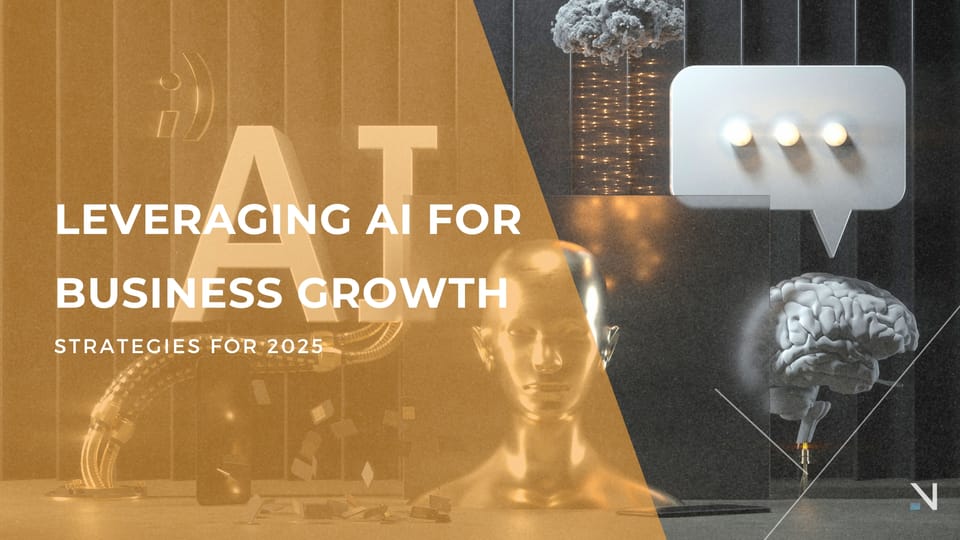Leveraging AI for Business Growth: Strategies for 2025
Narima Digital •

Artificial Intelligence (AI) isn’t just for tech giants anymore. From small businesses to large enterprises, companies worldwide are using AI to drive growth, improve efficiency, and stay ahead of the competition. If you’re not leveraging AI in your business strategy yet, 2025 is the year to start.
But where do you begin? AI isn’t just one tool—it’s a collection of technologies that, when used correctly, can revolutionize the way you operate, market, and make decisions.
Let’s break down how you can use AI to fuel business growth in 2025—without the jargon, just actionable strategies.
Why AI Matters for Business Growth
AI is more than a trend—it’s a game-changer. Companies that use AI effectively can make faster decisions, automate repetitive tasks, personalize customer experiences, and uncover new revenue opportunities.
Some key benefits of AI in business include:
- Increased efficiency – Automating routine tasks saves time and reduces costs.
- Better decision-making – AI-driven analytics help businesses make data-backed decisions.
- Enhanced customer experiences – Personalized interactions improve customer satisfaction and loyalty.
- New revenue streams – AI-powered insights help identify market gaps and new opportunities.
If AI can improve nearly every aspect of a business, the real question isn’t whether to adopt it—it’s how to use it effectively.
1. Automate Repetitive Tasks to Boost Efficiency
Time is money, and AI can help businesses save both by automating tedious, repetitive tasks. From handling customer inquiries to managing supply chains, automation lets your team focus on high-value work.
Some of the best AI-powered automation strategies include:
- AI chatbots for 24/7 customer support and lead generation.
- Automated invoice processing to reduce human errors in accounting.
- AI-driven scheduling tools to manage employee shifts or customer appointments.
- Intelligent email responses to handle FAQs without manual intervention.
By offloading these tasks to AI, businesses can cut costs and improve productivity without adding headcount.
2. Use AI for Smarter Decision-Making
Data-driven decisions are the future of business. AI-powered analytics tools can process massive amounts of data in seconds, uncovering trends and insights that humans might miss.
Here’s how AI can improve business decision-making:
- Predict customer behavior based on past interactions and buying patterns.
- Optimize pricing strategies with AI-driven demand forecasting.
- Detect fraud and security threats before they become a problem.
- Identify operational inefficiencies and recommend improvements.
AI isn’t about replacing human decision-makers—it’s about empowering them with better insights so they can make smarter choices, faster.
3. Personalize Customer Experiences with AI
Consumers today expect hyper-personalized experiences, and AI makes that possible. Instead of generic marketing messages, AI enables businesses to tailor offers, recommendations, and interactions to individual preferences.
Some ways businesses can use AI for personalization include:
- AI-driven product recommendations (like Netflix and Amazon do).
- Smart chatbots that offer personalized responses based on user history.
- AI-powered email marketing that adjusts content based on customer behavior.
- Dynamic pricing models that change in real time based on demand and user behavior.
The more personalized the experience, the more engaged (and loyal) your customers will be.
4. Improve Sales & Marketing with AI
Marketing and sales teams can work smarter, not harder, by using AI to refine their strategies and increase conversions.
Here’s how AI is transforming sales and marketing:
- Lead scoring and segmentation – AI identifies high-potential leads based on past interactions.
- Automated ad targeting – AI adjusts ad campaigns for maximum ROI.
- Content generation – AI-powered tools can create SEO-friendly blog posts, social media content, and even ad copy.
- Voice search optimization – AI helps businesses rank for voice searches on Siri, Alexa, and Google Assistant.
By integrating AI into marketing, businesses can attract more customers, convert leads faster, and optimize ad spending for better returns.
5. Optimize Supply Chain & Logistics with AI
For businesses that rely on supply chains, AI can help predict demand, reduce waste, and improve logistics efficiency.
AI-driven supply chain optimizations include:
- Demand forecasting – Predict sales trends to prevent overstocking or shortages.
- Smart inventory management – AI automatically reorders stock based on real-time data.
- Route optimization – AI finds the fastest, most cost-effective shipping routes.
- Supplier risk assessment – AI identifies potential issues with suppliers before they affect business operations.
By reducing costs and improving supply chain efficiency, businesses can stay agile and competitive.
AI is the Future—Are You Ready?
AI isn’t just for big corporations—it’s accessible to businesses of all sizes. Whether you’re automating tasks, using AI-driven insights, personalizing customer experiences, or optimizing logistics, AI can be the key to business growth in 2025.
The sooner businesses adopt AI-driven strategies, the better positioned they’ll be for the future. So, how is your company leveraging AI? If you’re looking to integrate AI into your business operations, Narima can help. Let’s build AI-powered solutions that drive real results!


